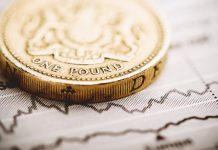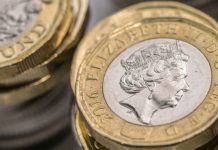Domestic UK political woes weighed on the pound pulling it lower on Wednesday. Sterling slipped lower throughout the previous session hitting a low of €1.1284, before picking up slightly towards the end of the session.
| What do these figures mean? |
|---|
|
When measuring the value of a pair of currencies, one set equals 1 unit and the other shows the current equivalent. As the market moves, the amount will vary from minute to minute. For example, it could be written: 1 GBP = 1.13990 EUR Here, £1 is equivalent to approximately €1.14. This specifically measures the pound’s worth against the euro. If the euro amount increases in this pairing, it’s positive for the pound. Or, if you were looking at it the other way around: 1 EUR = 0.87271 GBP In this example, €1 is equivalent to approximately £0.87. This measures the euro’s worth versus the British pound. If the sterling number gets larger, it’s good news for the euro. |
After climbing for the first part of the week, the pound came under the strain of local political turmoil as UK Prime Minister Theresa May lost her second cabinet member in recent weeks. Firstly, a sexual harassment scandal engulfing UK parliament saw UK Defence Secretary Michael Fallon hand in his resignation. Then yesterday, UK International Development Secretary Priti Patel’s found herself in the firing line, after admitting to holding unauthorised meetings with high-ranking Israeli Officials.
Theresa May faces a make or break month after this cabinet chaos. The UK Conservative party have allegedly given Theresa May until Christmas to sort out her administration. The increased political instability weighed on the pound’s appeal, sending it lower.
| How does political stability boost a currency? |
|---|
| Political stability boosts both consumer and business confidence, which means corporations and regular households alike are more likely to spend money. The increased spending, in turn, then boosts the economy. Foreign investors prefer to invest their money in politically stable countries as well as those with strong economies. For foreign investors to put their money into an economy, they need local currency. As they acquire the money needed, the demand for that particular currency increases, which then boosts its value. |
This type of chaos in the cabinet is far from ideal at any time, but even less so when the UK is undergoing tough Brexit negotiations with the EU leaders. The cabinet chaos could undermine Theresa May’s political power and negatively impact on Brexit negotiations.
Today, the next round of Brexit talks begin in Brussels. Should headlines suggest that progress is being made in the negotiations and that there is a serious possibility of transition deal talks and post-Brexit trade talks beginning in December, the pound could quickly recover yesterday’s losses.
Can the ECB Economic Bulletin Change Investor Opinion of a Dovish central bank?
Demand for the euro was weak in the previous session, however, it was still stronger than the demand for the pound. While the eurozone continues to produce solid economic data, the data isn’t sufficiently strong to change the European Central Bank’s (ECB) monetary policy outlook.
The ECB will start to decrease their bond-buying programme in January. The bond-buying programme is one of the ways the ECB increases money supply in the economy. It buys particular bonds in place of an investor, thus giving the investor a chance to use his money to buy other bonds. The central bank has also forecasted that inflation is likely to dip again next year. With weaker inflation, the ECB is in no rush to start hiking interest rates. The bank has made it clear on numerous occasions that they don’t intend to start raising interest rates until 2019 at the earliest.
As the odds of an interest rate rise are pushed further into the future, the euro has lost some of its appeal.
| Why do raised interest rates boost a currency’s value? |
|---|
| Interest rates are key to understanding exchange rate movements. Those who have large sums of money to invest want the highest return on their investments. Higher interest rate environments tend to offer higher yields. So, if the interest rate or at least the interest rate expectation of a country is relatively higher compared to another, then it attracts more foreign capital investment. Large corporations and investors need local currency to invest. More local currency used then boosts the demand of that currency, pushing the value higher. |
Today, investors will look towards the ECB economic bulletin and German trade data. Strong figures here could help revive the euro.
|
This article was initially published on TransferWise.com from the same author. The content at Currency Live is the sole opinion of the authors and in no way reflects the views of TransferWise Inc. |





